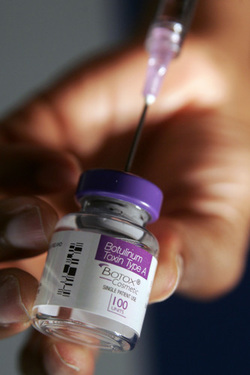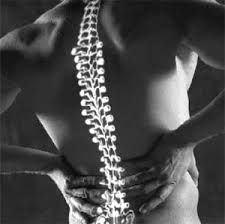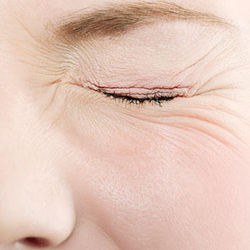STAND UP TO CHRONIC MIGRAINES and headaches!
Botulinum Toxin Type a (Botox)

BOTOX was registered for the prophylaxis of headache in adults with Chronic Migraine (headaches on at least 15 days per month; at least 8 of which are migraine) in April 2012. (Reference 1)
Chronic migraines can have a dramatic effect on all aspects of a person's life and those of their family. In pivotal studies, 50% of patients treated with BOTOX saw their headache days reduced by 50% over two treatments (24 weeks). (Reference 2)
BOTOX is subsidised by the Federal Government for the treatment of migraines by neurologists. The toxin requires a small co-payment of less than 5% of the cost of the medication. This is arranged by us at the time of your consultation. Certain types of facial pain and headache may not be eligible for PBS subsidised toxin and the specialist doctor will discuss estimated cost of treatment with you if required. All consultations with our doctors attract a Medicare rebate.
Reference 1: Botox Approved Product Information
Reference 2: Dodick DW et al. Headache 2010; 50 (6):921-936
Chronic migraines can have a dramatic effect on all aspects of a person's life and those of their family. In pivotal studies, 50% of patients treated with BOTOX saw their headache days reduced by 50% over two treatments (24 weeks). (Reference 2)
BOTOX is subsidised by the Federal Government for the treatment of migraines by neurologists. The toxin requires a small co-payment of less than 5% of the cost of the medication. This is arranged by us at the time of your consultation. Certain types of facial pain and headache may not be eligible for PBS subsidised toxin and the specialist doctor will discuss estimated cost of treatment with you if required. All consultations with our doctors attract a Medicare rebate.
Reference 1: Botox Approved Product Information
Reference 2: Dodick DW et al. Headache 2010; 50 (6):921-936
| Allergan Media Release - September 2011 |
| BOTOX Consumer Medicine Information |
physical therapy

Physical therapy at the Migraine Clinic may involve specific physical treatment from one of our trained physical therapists in the region of the cervical spine, or upper back. Many patients have co-existing problems of neck arthritis or injury and abnormal muscle patterns. Structured exercise plans are offered and many clients find these extremely helpful.
Medications commonly used

FOR MIGRAINES
A: Reliever medications
These are used once a migraine has commenced. They are mainly antiinflammatory medications, or drugs that aim to change the blood flow to the affected areas.
Panadol is a mainstay of migraine treatment, and is often combined with other drugs. Panadol can also cause headache with both a withdrawal headache and a headache with overuse.
Non steroidal antiinflammatory drugs such as nurofen, indomethacin and voltaren help to decrease the inflammation in the irritated nerves, and are useful in most cases of migraine.
Triptans such as sumotriptan are also useful, and act on the serotinin neurotransmitter to decrease the irritability of the affected nerves. They can cause a serious interaction with antidepressant medications and can also cause spasm of the coronary arteries.
Antinausea drugs such as maxolon relieve some of the migraine symptomatology
Caffeine alters the production of cerebrospinal fluid and changes some aspects of the blood supply to the nerves.
Opioids such as oxycontin, codeine or endone are not recommended for regular usage as they are addictive, behaviour altering and change the perception of pain stimulus
Glucocorticoids such as dexamethasone or prednisolone are not regularly used as they have significant metabolic side effects
B: Preventative medications
Heart drugs such as beta blockers (propanolol), calcium blockers (diltiazem, nifedipine) and angiotensin blockers (lisinopril, candesartan) all have an effect on migraine, although the mechanism of action is unclear.
Anticonvulsants (sodium valproate, topiramate) and antidepressants (amitryptilline, venlafaxine) act on neurotransmitters to try to increase the resilience of the nerves to migraine triggers.
Botulinum toxin (botox) acts to decrease spasm of the scalp muscles and is thought to also act directly on the nerve endings to reduce their sensitivity to migraine triggers.
FOR CLUSTER HEADACHES
A: Reliever medications
Oxygen given early can significantly reduce the severity of the headache
Triptans (including those given intranasally)
Local anaesthetic
Octreotide
B: Preventer medications
Heart drugs (as above)
Glucocorticoid medications such as dexamethasone or prednisolone can reduce the severity of the headaches, however these have significant problems when used long term
Lithium carbonate is a mood stabiliser, however it also has some effect on cluster headache activity
Nerve blocks such as occipital nerve blocks can give good short term relief while more lasting preventers are commenced.
Melatonin taken at night
A: Reliever medications
These are used once a migraine has commenced. They are mainly antiinflammatory medications, or drugs that aim to change the blood flow to the affected areas.
Panadol is a mainstay of migraine treatment, and is often combined with other drugs. Panadol can also cause headache with both a withdrawal headache and a headache with overuse.
Non steroidal antiinflammatory drugs such as nurofen, indomethacin and voltaren help to decrease the inflammation in the irritated nerves, and are useful in most cases of migraine.
Triptans such as sumotriptan are also useful, and act on the serotinin neurotransmitter to decrease the irritability of the affected nerves. They can cause a serious interaction with antidepressant medications and can also cause spasm of the coronary arteries.
Antinausea drugs such as maxolon relieve some of the migraine symptomatology
Caffeine alters the production of cerebrospinal fluid and changes some aspects of the blood supply to the nerves.
Opioids such as oxycontin, codeine or endone are not recommended for regular usage as they are addictive, behaviour altering and change the perception of pain stimulus
Glucocorticoids such as dexamethasone or prednisolone are not regularly used as they have significant metabolic side effects
B: Preventative medications
Heart drugs such as beta blockers (propanolol), calcium blockers (diltiazem, nifedipine) and angiotensin blockers (lisinopril, candesartan) all have an effect on migraine, although the mechanism of action is unclear.
Anticonvulsants (sodium valproate, topiramate) and antidepressants (amitryptilline, venlafaxine) act on neurotransmitters to try to increase the resilience of the nerves to migraine triggers.
Botulinum toxin (botox) acts to decrease spasm of the scalp muscles and is thought to also act directly on the nerve endings to reduce their sensitivity to migraine triggers.
FOR CLUSTER HEADACHES
A: Reliever medications
Oxygen given early can significantly reduce the severity of the headache
Triptans (including those given intranasally)
Local anaesthetic
Octreotide
B: Preventer medications
Heart drugs (as above)
Glucocorticoid medications such as dexamethasone or prednisolone can reduce the severity of the headaches, however these have significant problems when used long term
Lithium carbonate is a mood stabiliser, however it also has some effect on cluster headache activity
Nerve blocks such as occipital nerve blocks can give good short term relief while more lasting preventers are commenced.
Melatonin taken at night
Psychology

We have experienced psychologists to treat the associated anxiety, depression, stress and frustration that many people with chronic pain and headaches feel. SEE HERE
We have a specialist psychiatrist on our team because occasionally severe chronic headaches can make you suicidal.
There is no shame in needing psychological support to deal with this serious health issue. These consultations are optional and at extra cost.
